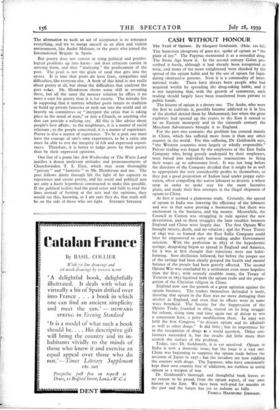CASH WITHOUT HONOUR
The Trail of Opium. By Margaret Goldsmith. (Hale. 12S. 6d.) THE Sumerian ideograms of 4000 B.C. spoke of opium as "the plant of joy." The Papyrus mentioned it as a remedial drug. The Stone Age knew it. In the second century Galen pre- scribed it freely, although it had already been recognised as toxic, and many of the more enlightened were shocked by the spread of the opium habit and by the use of opium for liqui- dating obstructive persons. Now it is a commodity of inter- national trade. There have always been people who had acquired wealth by spreading the drug-taking habit; and it is not surprising that, with the growth of commerce, such trading should largely have been transferred from private to public hands.
The history of opium is a dreary one. The Arabs, who were the first to cultivate it, possibly became addicted to it in lieu of the alcohol denied them by Mohammed; but when the great explorers had opened up the routes to the East it ceased to be an Eastern monopoly and in the sixteenth century the Merchant Adventurers brought it to England.
For the past two centuries the problem has centred mainly in China, which has suffered more from it than any other country in the world. For this suffering, Dr. Goldsmith says, "the Western countries were largely or wholly responsible." Private trading was begun by the employees of the East India Company who, being grossly underpaid by their employers, were forced into individual business transactions to bring their wages up to subsistence level. It was not long before the directors of the Company decided that it might be as well to appropriate the very considerable profits to themselves; so they put a good proportion of Indian land under poppy culti- vation, often compelling the native labourer to destroy a wheat crop in order to make way for the more lucrative plant, and made their first attempts at the illegal shipment of opium to China.
At first it seemed a glamorous trade. Certainly, the spread of opium in India was lowering the efficiency of the labourer and was in that sense proving a boomerang ; but there was excitement in the business, and big money. Meanwhile, the Council in Canton was struggling in vain against the new. devastation, and to these struggles the later troubles between England and China were largely due. The first Opium War brought misery, death, and no solution ; and the Peace Treaty of 1842 was so framed that the East India Company could later be empowered to carry on trading under Government sanction. With the perfection in 1853 of the hypodermic syringe, drugtaking began to spread in England and America, for it was at first thought that injections were not habit- forming. Sore disillusion followed, but before the proper use of the syringe had been clearly grasped the health and mental balance of the people had been gravely affected. The second Opium War was concluded by a settlement even more hopeless than the first ; with scarcely credible irony, the Treaty of Tientsin in 1853 legalised both the opium trade and the propa- gation of the Christian religion in China.
England now saw the growth of a great agitation against the opium business. The traders themselves defended it hotly, insisting that opium in the East was no more damaging than alcohol in England, and even that its effects were in some ways beneficial. The Society for the Suppression of the Opium Trade, founded in 1874, started on its long struggle for reform, rising time and time again out of defeat to win a concession here, a petty modification there. In 1905 was held the first Congress "to discuss opium and its alkaloids as well as other drugs." It did little ; but its importance lay in the recognition of drugs as a world question. Other con- ferences succeeded it, but the results did little more than scratch the surface of the problem.
Today, says Dr. Goldsmith, it is yet unsolved. Opium in India is now a domestic issue, but the issue is a vast one. China was beginning to suppress the opium trade before the invasion of Japan in 1937; but the invaders are now riddling the country with drugs. The Japanese, who have consistently kept their own country free of addiction, are ruthless in using opium as a weapon of war.
Dr. Goldsmith's thorough and thoughtful book leaves us no reason to be proud, from the opium aspect, of our own history in the East. We have been well-paid for murder in the past and the future has yet to redeem us fully.
PAMELA HANSFORD JOHNSON.








































 Previous page
Previous page